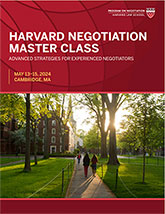
Reverse auctions are becoming a more frequent reality of business contract negotiations as companies work to cut expenses. In most negotiations, however, price is not the only issue. Guhan Subramanian, Joseph Flom Professor of Law & Business at Harvard Law School and Douglas Weaver Professor of Business Law at Harvard Business School, answered a question recently about how to approach these competitions.
What to do when a business contract negotiation turns into a reverse auction
Q: For years, my company had long-term relationships with our customers, in which we would sit down for annual negotiations. But over the past few years, more of our customers have required us to participate in “reverse auctions” run by procurement departments. Sometimes these auctions are online, and sometimes they are in person; sometimes they are requests for quotes, and sometimes they are requests for proposals. But in every case, it is clear that the customer is pitting us against our biggest competitors in order to drive the price down as much as possible—and our long-term relationship sometimes ends as a consequence. What should we do?
Guhan Subramanian: In our global marketplace, the business contract scenario you describe is becoming increasingly common. The first step is to think through whether a reverse auction (aka a procurement auction) is the right way to run the process—not only for you but also for your customer. In my book, Dealmaking: The New Strategy of Negotiauctions (W.W. Norton, 2011), I identify 11 factors that “process-setters” (like your prospective customers) should think through before deciding whether to hold an auction. For example, if nonprice factors (such as relationship and service) are important, then a procurement auction often can be a bad idea.
A few years ago, a company was caught off guard by a surprise procurement auction held by one of its longtime customers. The auction would be for a services contract, where relationship, quality, and service were just as important—if not more important—than price. In this context, the supplier thought an auction might drive down the price for the customer but would not give the customer what it actually cared about.
During an emergency meeting, those involved decided that, instead of taking the auction as given, the team leader should ask to meet with the customer’s point person to get a better sense of why the customer was holding an auction in the first place.
A few days later, the team leader e-mailed with the result of his meeting: “Great news! We just spoke with [the customer’s] procurement, and they informed us that senior management has decided not to put its strategic partners through the e-auction process. They are planning to come back to us in the weeks ahead with some thoughts on how to ensure they are getting appropriate value from their partners. I’m not exactly sure what that means, but this is a very positive development.” Later that week came this update: “Over the coming months, they will conduct a dialogue with [us] to determine how we can improve our overall value proposition (i.e., not just price). . . . This is fantastic news.”
As this business contract example illustrates, you may be able to help educate your customer about its negotiation process. Although procurement departments often like auctions for the price reductions they can achieve, sometimes more nuanced processes can help the customer get what is really important to it.
If your customer believes (correctly or not) that an auction is the right way to proceed, ask for permission to put two or three different packages into the auction. This has two benefits. First, it gives you more than one “bite at the apple,” with quantified tradeoffs between price and other terms. Second, and more important, it shows your customer that you are working hard to give it what it wants. This idea is the auction equivalent of the “MESO” (multiple equivalent simultaneous offers) strategy you might have encountered in one-on-one negotiations.
In general, you should not just accept the auction process as given, submit your bid, cross your fingers, and hope for the best. Rather, try to shape the game in ways that create win-win opportunities for you and your customer.
Have you faced similar situations in your business contract negotiations? How did you find a solution?





